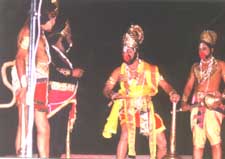Sundarakandam - Golden Jubilee Celebrations Of The Indian National Theater

Sundarakandam - Golden Jubilee Celebrations Of The Indian National Theater is an event that took place between 03-May-2001 and 04-May-2001 in Hyderabad.
-
Venue
-
Date/Time
-
Type
-
Price
-
Venue Website
-
Add New Field:
It has been the budding ground for many a dream weaver. It is also the place where histrionics reached dizzy heights. As part of its golden jubilee celebrations, the Indian National Theater presented two contrasting plays, perhaps to prove their versatility. One described the bathos plaguing humanity and the other, a super-glorification of it.
The first play, Sabse Sasta Gosht, a Hindi play written by Aszar Wajahath, was a poignant tale of the exploitation of the human species. With a message that the cheapest gosht (meat) available is that of man, and enacted by a mixture of teenagers and other young adults, this street play has been presented over 30 times in the old city and in other places, and has won appreciation all over. Koshish Theater Group - COVA did a commendable job with this experimental form.
At the ceremony, the organizers spoke of the yeoman service of their founders and supporters, mentioning well-known names like A R Krishna etc. The function was brief, with the few present being honored for various functions.
Then Sundarakanda, the mythological play, took off, quite traditionally with Parabrahma Parameswara, the opening song of every mythological play. The interlude music was good, but one felt the tunes a trifle filmi. Written by the well-known Eeranki Seetaramiah (who directed other plays like Vivekananda etc) and directed by Patro, the play was presented by Yuva Kala Vahini.
The costumes were well designed, but that's nearly all that we can say without being nasty. Anjaneya's crown kept tilting to all sides, but unmindful of such trivia, he belted out the padyams and other dialogues with gusto and feeling. One wished his legs were as strong as his powerful voice.
The frequently mentioned 'soiled sari' of Sita looked quite clean and bright. What needed some cleansing was her dialogue delivery. Ravana was highly villainous with his laughter conveying evil in every bellow. Others in the cast carried the play on weary shoulders.
The gaps between the dialogues were as wide as the yawning mouths of the audience. The insincerity in their preparation was conspicuous, as their lack of a proper rehearsal was showing. They seem to take viewers' (lack of) intelligent grasp for granted. There is one old man who frequents Ravindra Bharathi for every mythological play. The last time I encountered him, I reprimanded him for cheering too loudly, drowning the lines of the actors on stage. This evening it was his loud yawns, as well as those of the others', that filled the long silences between dialogues.
SU
Be the first to comment on Sundarakandam - Golden Jubilee Celebrations Of The Indian National Theater! Just use the simple form below.
LEAVE A COMMENT
fullhyd.com has 700,000+ monthly visits. Tell Hyderabad what you feel about Sundarakandam - Golden Jubilee Celebrations Of The Indian National Theater!
MORE EVENTS IN THIS PERIOD
ALL EVENT CATEGORIES
SEARCH EVENTS
Dissatisfied with the results? Report a problem or error, or add a listing.